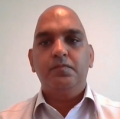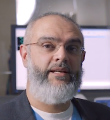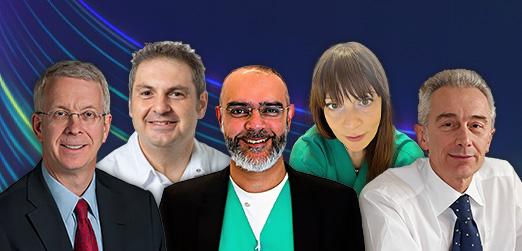- Home
- Convergent Procedure for Atrial Fibrillation: Advanced Understanding and Practical Discussion
Convergent Procedure for Atrial Fibrillation: Advanced Understanding and Practical Discussion
- Heart Rhythm
- Intervention
Available Credit:
- 1.00
Course Published On:
Course Expiry Date:

Overview
This CME-accredited virtual symposium combines presentations from leading practitioners, discussions, and procedural videos to look at the latest data, patient selection, fundamentals of the procedure and the set-up of a convergent AF programme.
The cornerstone of atrial fibrillation (AF) is electrical isolation of the pulmonary veins (PV). In patients with non-paroxysmal AF, PV isolation alone is insufficient and one needs to modify the atrial arrhythmogenic substrate. AF ablation is now a common procedure and mostly performed using a transvenous, endocardial approach with catheters. For patients with persistent AF however, this procedure is not sufficient.
There is a growing movement towards a convergent procedure management strategy, used alongside standard catheterisation techniques to optimise patient outcomes. More and more research suggests that an integrated approach involving multidisciplinary teams (of electrophysiologists and surgeons) may lead to improved success rates and increased patient satisfaction.
Convergent procedure is a promising therapy for patients’ refractory to standard AF treatment, however the approach involves some challenges that require specific attention from the medical specialities involved. Whilst a relatively new way of working for both EPs and surgeons, the benefits and best ways of implementing this in clinical practice are still largely unknown.
Endorsed by the British Heart Rhythm Society (BHRS), this programme has been accredited by the European Board of Accreditation in Cardiology (EBAC) for 1 hour of External CME credits.
Terms & Conditions
Radcliffe Education requires contributors to our CME programmes to disclose any relevant financial relationships that have occurred within the past 12 months that could create a conflict of interest. These will be identified in the faculty section if applicable.
Support Statement
This programme is supported by an unrestricted educational grant from AtriCure. The scientific programme has not been influenced in any way by the sponsor.
Disclosure
In compliance with EBAC / EACCME guidelines, all speakers/chairpersons participating in this programme have disclosed or indicated potential conflicts of interest which might cause a bias in the presentations.
The Organising Committee/Course Director is responsible for ensuring that all potential conflicts of interest relevant to the event are declared to the audience prior to the CME activities.
This activity has been supported by an unrestricted educational grant from AtriCure.
Instruction to Participants
There is no fee for taking part in this online learning activity.
Activities are designed to be completed within 60 minutes and must be completed by the registered user. Physicians should only claim credits for time spent on the activity. To successfully earn credit, participants must complete the activity in full in the indicated time frame.
To complete the course and claim certification participants must:
1. Read the course outline information supplied and complete pre-test questions if supplied prior to starting the activity. Users must read and study the activity in its entirety before completing the post-test questions.
2. Your results will be automatically saved and if a pass score is achieved (where applicable), you may be eligible to claim credit for the activity and receive a certificate of completion.
Target Audience
- Electrophysiologists
- General Cardiologists
Learning Objectives
Upon completion of this activity, participants will be able to:
- Discuss the need for optimal approaches to atrial ablation and identify patients for whom a convergent procedure approach is indicated
- Describe the convergent procedure and the role of electrophysiologist and surgeon
- Discuss current clinical understanding of the convergent procedure including emerging data and the role of the left atrial appendage in ablation
Module |
Title |
Duration |
Speakers |
|---|---|---|---|
| 1 | Introduction to the topic | Yuri Blaauw (University Medical Center Groningen, Groningen, The Netherlands) | |
| 2 | Who is a candidate for the convergence procedure and what is the evidence? | Syed Ahsan (Barts Heart Centre, St Bartholomew’s Hospital, London, UK) | |
| 3 | How to perform the convergent procedure and address the left atrial appendage | Felix Yang (Maimonides Medical Center, NY, US) | |
| 4 | How to set-up a successful convergent ablation programme | Riyaz Kaba (St George’s Hospital, London, UK) |
Introduction to the topic
Duration:
Speakers: Yuri Blaauw (University Medical Center Groningen, Groningen, The Netherlands)
Who is a candidate for the convergence procedure and what is the evidence?
Duration:
Speakers: Syed Ahsan (Barts Heart Centre, St Bartholomew’s Hospital, London, UK)
How to perform the convergent procedure and address the left atrial appendage
Duration:
How to set-up a successful convergent ablation programme
Duration:
Course Director
Speaker
The event ‘Convergent Procedure for Atrial Fibrillation: Advanced Understanding and Practical Discussion’ is accredited by the European Board for Accreditation in Cardiology (EBAC) for 1 hour of external CME credits.
Each participant should claim only those hours of credit that have actually been spent in the educational activity. EBAC works according to the quality standards of the European Accreditation Council for Continuing Medical Education (EACCME), which is an institution of the European Union of Medical Specialists (UEMS).
Through an agreement between the European Board for Accreditation in Cardiology and the American Medical Association, physicians may convert EBAC External CME credits to AMA PRA Category 1 Credits™. Information on the process to convert EBAC credit to AMA credit can be found on the AMA website.





